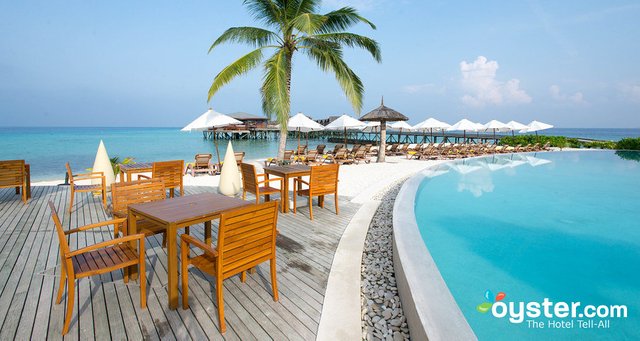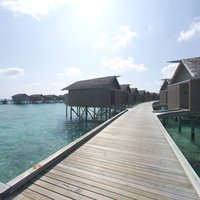Centara Ras Fushi Resort & Spa Male, North Male Atoll, Kaafu Atoll

Pros
A fun, adult-only resort with affordable prices
Most rooms are overwater villas with private decks
Excellent (well-trained) staff and lots of thoughtful touches
Top-notch dive center with multilingual instructors
Modern furnishings and bathrobes; some have private hot tubs
Fun beach, pool scene, and pool bar; the pool has magical lighting at night
Varied dining options and 24-hour room service
Viu Bar is a highlight -- especially at sunset
Water sports, excursions, and land activities available
Thai-themed spa with nine treatment rooms
Weekly manager’s cocktail party
Free Wi-Fi
Cons
Not the prettiest island, or the best house reef
When it's hot, it’s really hot (sometimes breezeless!)
Long walks on the jetty to some of the water villas
No umbrellas for shade on the private decks
Time limitations for the free non-motorized water sports
Bottom Line
Open since 2013, this well-managed resort close to the airport has 140 rooms, either along the shore or overwater on stilts (reached via a lengthy jetty). Thailand-based Centara has two properties in the Maldives, both known for offering luxury accommodations at competitive prices, and this particular one is aimed at young couples (no guests under the age of 12 are allowed). It’s not the prettiest island or best house reef for snorkeling, but its service is exceptional, a rarity at this price point. The buffet serves a wide mix of European and Asian cuisines, while three a la carte restaurants (Thai, Italian, and Middle Eastern) and three bars keep the mainland fun and lively; both half-board and all-inclusive rates are on offer. All rooms have flat-screen TVs, DVD players, bathrobes, and 24-hour room service, but no umbrellas on the private villa decks -- and it will get hot in the afternoon sun. Luckily there are tons of water-based activities including an outstanding dive center for newbies. Wi-Fi is free.








What It's Like
Made up of nearly 2,000 small islands, the natural, stunning beauty of the Maldives archipelago lives up to its screensaver status. The white-sand beaches, blue skies, tropical green landscapes, crystal clear turquoise waters; it’s the stuff dream vacations are made of -- every angle is practically postcard perfect. The islands’ coral reef atolls and lagoons present visitors with easy access to an abundance of underwater sea life, from bioluminescent plankton to whale sharks, making it one of the best places in the world to snorkel, dive, and whale-watch year-round. Maldives is a friendly, slow-paced, peaceful island nation that is also home to a 100 percent Islamic population. This means there are several strict and strictly enforced rules around what can be brought into the country (no alcohol, cigarettes, pork products, etc.), spoken or worn in public (particularly for women), and public displays of affection. Male, the island capitol, is the most bustling of all local islands and has tall buildings, a population in the hundred thousands, and loud, congested streets. The other city-style islands, Hulhulmale and Hulhle, have a quieter vibe more akin to a small town. Here you’ll see locals walking the streets, small shops, restaurants, and water sports activities. Other inhabited local islands are mainly used for agriculture and export goods, and locals tend to appear further down the economic ladder; local customs and laws need to be respected when visiting the local islands. There are a growing number of guesthouses on local islands, meaning tourists have the chance to experience a more authentic view of Maldivian culture and save a substantial amount of money. Some hotels on local islands even offer alcohol, though it is very expensive. Life on resort islands is another world. These have relaxed, “Westernized” laws, so tourists can wear bikinis, drink alcohol, smoke, and canoodle freely (though nude sunbathing is never allowed). Most resorts have staff mostly comprising Maldivians, Sri Lankans, and Indians, though managers are usually from Western countries. Depending on the facilities of your resort, life on resort islands is about as chilled out as it gets. However, while the beauty of the Maldives is undeniable, it’s not without its blemishes: there was a devastating drinking water shortage in 2014 (now all the islands use water processed through reverse-osmosis, which unfortunately also removes important minerals), several islands are disappearing due to rising sea levels and beach erosion, disposing of an overabundance of trash is a continual problem, and many of the island nation’s locals live in poverty.We’re not going to sugarcoat it, getting to the Maldives can be surprisingly expensive, especially once you add on the cost of transportation to your resort island, which can be as much as your flights. All international flights land in the small, functional Ibrahim Nasir International Airport on Hulhule Island. Speedboat transfers to resort islands leave from across the street, while those taking seaplanes are transported to a tiny, open-air terminal a short drive away. Seaplane schedules can be tricky, leaving long layovers in the small terminal (which has a cafe, seating, and even some resort lounges), but passengers are rewarded with unforgettable aerial views over the atolls.
Where to Stay
In Maldives, resorts are located on their own private island. This means your resort -- and the people staying in it -- are all you’ve got for entertainment, socializing, and atmosphere. Restaurants, bars, spas, pools, games, pools, and entertainment are often found at resorts, but not always and transportation between islands is limited if nonexistent, so it’s imperative to fully research your resort and specific island before booking. It’s also good to keep the cost, mode, and length of transportation to/from your resort island to the mainland in mind. For example, while Sheraton Maldives Full Moon Resort is a quick 20-minute speedboat-only ride from the airport and is the closest via seaplane, other resorts can be up to several hours and seaplane transfers away. The Maldives is broken up into 26 different atolls, or collections of islands, with some areas being better spots than others for certain activities. Beach size, offshore snorkeling and diving capabilities, meal plans, availability of alcohol, day trips and tours, and family-friendly or adults-only resorts vary by island -- and sometimes season. It’s good to acknowledge that most of the staff will be South Asian and may not be 100 percent fluent in English or other tourist languages, so communicate with patience, especially during the holy month of Ramadan when the local staff will be fasting. During Ramadan, some shops and services may be unavailable during prayer time. Those looking for their best chances of spotting or swimming with whale sharks or manta rays should stick to the South Ari Atolls, while some of the globe’s best dive spots are near the Meemu and relatively untouched Gaafu Atoll. North Male Atoll is a favorite spot for surfers thanks to Pasta Point, located right off Chaya Island Dhonveli, and its other reef-breaking waves. Typically, the best and largest beaches can be found on islands protected by a coral reef barrier, while others under threat of rising sea levels and beach erosion may have been forced to sacrifice idyllic beachfront in favor of protective sea walls or sandbags. Some resorts, like the uber-hip W Retreat & Spa Maldives and luxury Maafushivaru have their own, exclusive private islands (in addition to the resort island), while a big resort perk from Constance Moofushi is the super comfy and convenient seaplane terminal lounge. Overwater bungalows are usually popular -- and Gili Lankanfushi’s are some of the best -- but we recommend booking like most return guests do: half your stay in an overwater bungalow and half beachfront. Lily Beach Resort makes keeping costs in check easy with an upfront, truly all-inclusive plan, but be sure to the read the fine print wherever you choose, as strict times, quantity, privileges, and rules may apply. If you are on a budget, Ranveli Village, one of the Maldivian-owned resorts, gives one of the best bang-for-your-buck budget experiences in Maldives, just be sure to book a newly renovated room. We will leave you with a few pieces of advice: Be sure to be respectful of all of the current cultural customs for when you are on local islands, bring some rehydration packets (or buy them at the Male airport), ask for earplugs on your seaplane ride, and, since you’ll be lounging near the equator, don’t forget the sunscreen (biodegradable if possible).
This post was resteemed by @steemitrobot!
Good Luck!
The @steemitrobot users are a small but growing community.
Check out the other resteemed posts in steemitrobot's feed.
Some of them are truly great. Please upvote this comment for helping me grow.
follow @steemit-earn for more earning lessons